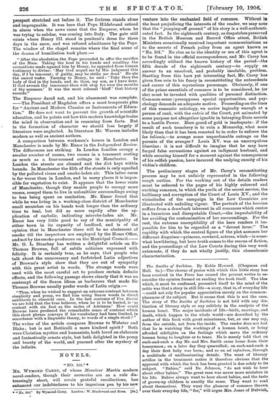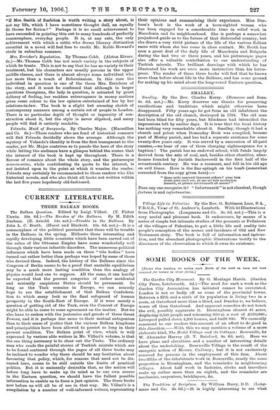The Smiths of Surbiton. By Keble Howard. (Chapman and Hall.
6s.)—The chorus of praise with which this little story has. been received in the Press has caused the present writer to re- consider the opinion formed on reading the book itself. The idea which, it must be confessed, presented itself to the mind of the critic was that a story in still life—a story, that is, of everyday life —could not rely for popular appreciation merely on the common- placeness of its subject. But it seems that this is not ' the case. The story of The Smiths of Surbiton is not told with any dis-, tinction of literary style or any subtlety in the analysis of the human heart. The major incidents of life—birth, marriage, and death, which happen to the whole world—are described by the author of this book with great minuteness, but, as one may say, from the outside, not from the inside. The reader does not feel that he is watching the workings of a human heart, or being• afforded sidelights on the feelings which move the ordinary human being to laughter or to tears. He is merely told that on such-and-such a day Mr. and Mrs. Smith came home frOm their honeymoon ; on a later day they quarrelled ; on such-and-such a day their first baby was born ; and so on ad infinitum, through a multitude of unilluminating details. The want of literary artifice in the treatment makes it therefore obvious that the approval with which the book has been greeted is due solely to its subject. "Babies," said Dr. Johnson, "do not wish to hear about other babies." The great man was never more mistaken in his life. Babies always want to hear about babies, and the taste. of grown-up children is exactly the same. They want to read about themselves. They want the glamour of romance thrown over their everyday life, " for," will argue Mrs. Jones of Dulwich, "if Mrs.. Smith of Surbiton is worth writing a story about, is not my life, which I have sometimes thought dull, an equally fit theme for fiction?" Perhaps it is no small achievement to have succeeded in pointing this out to many hundreds of perfectly commonplace, everyday people. It is, at any rate, the only achievement with which a critic who deems literary distinction essential in a novel will feel free to credit Mr. Keble Howard's study in suburban romance.











































 Previous page
Previous page